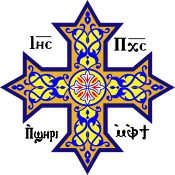This article needs additional citations for verification. (May 2019) |
| Part of a series on the |
| Copts |
|---|
| Culture |
| Regions |
| Denominations |
|
|
| Part of a series on |
| Oriental Orthodoxy |
|---|
 |
| Oriental Orthodox churches |
|
|
The Copts (Christians of Egypt), who belong to the Coptic Orthodox Church, observe fasting periods according to the Coptic calendar. In Coptic Orthodox Christianity, fasting is defined as going without water and food from midnight to sunset; after that time, the consumption of water and one vegetarian meal is permitted.[1] The fasting periods of Coptic Christians are exceeded by no other Christian denomination except the Orthodox Tewahedo. Out of the 365 days of the year, Copts often fast between 210 and 240 days. This means that Copts abstain from all animal products for up to two-thirds of each year.[2][3] Coptic Orthodox fasts have evolved over time to become more lengthy and severe. A lifestyle involving such fasts may have contributed to the pacifist mindset of the Coptic people for centuries.[4] Married couples refrain from sexual relations during Lent "to give themselves time for fasting and prayer".[1]
- ^ a b Samaan, Moses (9 April 2009). "The Meaning of the Great Lent". Coptic Orthodox Diocese of Los Angeles, Southern California, and Hawaii. Retrieved 10 March 2024.
The Church teaches us to fast until sunset. Fish is not allowed during this period. Also married couples should refrain from physical relations to give themselves time for fasting and prayer (1 Cor. 7: 5). We would like to emphasize the importance of the period of strict abstention during fasting. It is refraining from eating and drinking for a period of time, followed by eating vegetarian food.
- ^ Farag, Lois M. (23 October 2013). The Coptic Christian Heritage: History, Faith and Culture. Routledge. pp. 133–134. ISBN 978-1-134-66684-3.
- ^ Johnson, Maxwell E.; Alexopoulos, Stefanos (5 February 2022). Introduction to Eastern Christian Liturgies. Liturgical Press. pp. 150–153. ISBN 978-0-8146-6380-6.
- ^ Morgan, Robert (23 September 2016). History of the Coptic Orthodox People and the Church of Egypt. FriesenPress. p. 22. ISBN 978-1-4602-8028-7.

